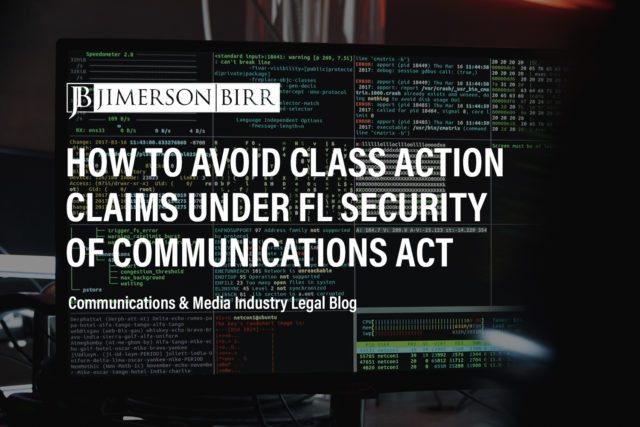How do content regulation and censorship affect communications and media companies?
Content regulation refers to the legal framework governing the production, distribution, and consumption of media content, ensuring compliance with standards related to decency, accuracy, and fairness. Compliance with these regulations is essential for media companies to avoid penalties, lawsuits, or reputational damage.
Censorship defense involves protecting the rights of media companies and content creators against censorship attempts by government entities, interest groups, or individuals. This defense is crucial for upholding freedom of expression and preserving the diversity of viewpoints in the media landscape.
In Florida, where the media industry is dynamic and diverse, content regulation and censorship defense shape the boundaries of permissible speech and expression. By understanding and adhering to applicable laws and regulations, media companies can navigate potential legal challenges, safeguard their intellectual property rights, and defend against censorship attempts, thereby ensuring the continued dissemination of diverse and engaging content to audiences.
Need help regarding content regulation or censorship? Schedule your consultation today with a top communications and media attorney.
In Florida, which laws and regulations apply to content regulation and censorship?
Several laws and regulations govern content regulation and censorship defense in Florida’s communications and media industry:
- Florida Communications Fraud Act (FCFA): The FCFA prohibits fraudulent or deceptive practices in advertising and communications, safeguarding consumers and businesses from misleading content.
- Florida Public Records Act (FPRA): The FPRA ensures public access to government records while providing exemptions for certain types of sensitive information, balancing transparency with privacy concerns.
- Florida Deceptive and Unfair Trade Practices Act (FDUTPA): FDUTPA regulates unfair or deceptive trade practices in various industries, including communications and media. It provides consumer protection against false advertising and fraudulent business practices.
What are common issues regarding content regulation and censorship that lead to litigation?
The following issues are among the most common in actions regarding content regulation and censorship:
- Copyright Infringement: Businesses may face litigation for using copyrighted material without permission, whether it’s images, videos, or written content, leading to claims of intellectual property theft.
- Defamation Claims: Publishing false statements that harm an individual’s reputation can result in defamation lawsuits, requiring businesses to defend their content’s accuracy and truthfulness.
- Obscenity Charges: Content containing explicit or offensive material may violate obscenity laws, prompting legal action and demands for censorship or removal.
- Privacy Violations: Publishing private information without consent can lead to lawsuits for invasion of privacy, necessitating careful handling of sensitive data and adherence to privacy laws.
- Regulatory Compliance: Failure to comply with content regulations, such as those related to advertising, labeling, or age restrictions, can result in fines, penalties, or legal action by regulatory authorities.
- First Amendment Challenges: Businesses may face litigation over alleged violations of free speech rights, requiring them to demonstrate a legitimate basis for content regulation or censorship.
We are value-based attorneys at Jimerson Birr, which means we look at each action with our clients from the point of view of costs and benefits while reducing liability. Then, based on our client’s objectives, we chart a path to seek appropriate remedies.
To determine whether your unique situation may necessitate litigation, please contact our office to set up your initial consultation.
What steps should businesses take to minimize the risk of litigation over content regulation and censorship?
To minimize the risk of litigation over content regulation and censorship defense, businesses can implement the following strategies:
- Comprehensive Content Review: Conduct regular reviews of all content to ensure compliance with copyright laws, defamation standards, obscenity regulations, and privacy requirements.
- Clear Content Policies: Develop and enforce clear content policies that outline acceptable content standards, review procedures, and consequences for violations, promoting consistent compliance across the organization.
- Legal Consultation: Seek legal guidance from experienced attorneys specializing in media law to review content, provide compliance advice, and address potential legal issues proactively.
- User Agreement and Disclaimers: Require users to agree to terms of service or use agreements that define permissible content, user responsibilities, and dispute resolution mechanisms, limiting liability and providing legal recourse.
- Training and Education: Provide comprehensive training to employees on content regulation, censorship defense, and legal compliance, empowering them to recognize and address potential risks effectively.
- Monitoring and Enforcement: Implement robust content monitoring systems to detect and address potential violations promptly, including automated filters, human moderators, and user reporting mechanisms.
- Transparency and Accountability: Maintain transparency in content moderation practices, communicate openly with users about policy changes or enforcement actions, and establish accountability mechanisms to address complaints and appeals effectively.
Frequently Asked Questions
What legal protections exist for freedom of speech in online communications?
Online communications are protected by the First Amendment to the United States Constitution, which guarantees freedom of speech, subject to certain limitations, such as defamation, obscenity, and incitement to violence.
How can businesses navigate conflicts between content regulation and freedom of speech?
Businesses can navigate conflicts between content regulation and freedom of speech by seeking legal guidance, implementing transparent content policies, and balancing regulatory compliance with respect for free expression rights.
What constitutes fair use of copyrighted material in media content?
Fair use of copyrighted material in media content generally involves using copyrighted material for purposes such as criticism, commentary, news reporting, or education, without infringing on the copyright owner’s rights.
Have more questions about a content regulation or censorship-related situation?
Crucially, this overview of content regulation and censorship does not begin to cover all the laws implicated by this issue or the factors that may compel the application of such laws. Every case is unique, and the laws can produce different outcomes depending on the individual circumstances.
Jimerson Birr attorneys guide our clients to help make informed decisions while ensuring their rights are respected and protected. Our lawyers are highly trained and experienced in the nuances of the law, so they can accurately interpret statutes and case law and holistically prepare individuals or companies for their legal endeavors. Through this intense personal investment and advocacy, our lawyers will help resolve the issue’s complicated legal problems efficiently and effectively.
Having a Jimerson Birr attorney on your side means securing a team of seasoned, multi-dimensional, cross-functional legal professionals. Whether it is a transaction, an operational issue, a regulatory challenge, or a contested legal predicament that may require court intervention, we remain tireless advocates at every step. Being a value-added law firm means putting the client at the forefront of everything we do. We use our experience to help our clients navigate even the most complex problems and come out the other side triumphant.
If you want to understand your case, the merits of your claim or defense, potential monetary awards, or the amount of exposure you face, you should speak with a qualified Jimerson Birr lawyer. Our experienced team of attorneys is here to help. Call Jimerson Birr at (904) 389-0050 or use the contact form to schedule a consultation.

We live by our 7 Superior Service Commitments
- Conferring Client-Defined Value
- Efficient and Cost-Effective
- Accessibility
- Delivering an Experience While Delivering Results
- Meaningful and Enduring Partnership
- Exceptional Communication Based Upon Listening
- Accountability to Goals











